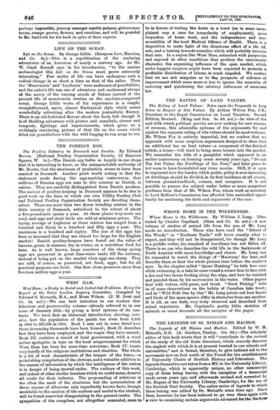WEST HAM.
West Ham: a Study in Social and Industrial Problems. Being the Report of the Outer Loudon Inquiry Committee. Compiled by Edward G. Howarth, M.A., and Mona Wilson. (J. N. Dent and Co. 6s. net.)—We can best introduce to our readers this laborious and praiseworthy volume—already referred to in our issue of January 25th—by giving a brief epitome of its con- tents. We have first an historical introduction showing, inter a/ia, how the population of the parish has risen from 6,485 in 1801 to 267,358 in 1901. Book I. sets out in some detail how these increasing thousands have been housed ; Book II. describes how they have been employed, and the wages they have earned ; Book UI. contains a record of local government, with a word rather apologetic in tone on the local misgovernment for which West Ham has been for some time notorious; Book IV. treats very briefly of the religious institutions and charities. The whole is a bit of work characteristic of the temper of the times,—a painstaking compilation of the obvious, and a valuable addition to the masses of information by which the intelligence of the nation is in danger of being snowed under. The authors of this work, and indeed of other similar treatises which we could name, deserve all credit for their industry. The propounding of solutions is too often the mark of the charlatan, but the accumulation of these messes of otherwise only imperfectly known facts, though creditable to the caution of the authors and useful to the student, will be found somewhat disappointing to the general reader. The sympathies of the compilers, not altogether concealed,-seem to • be in favour of vesting the docks in a trust (as in some unex- plained way a care for irregularity of employment), more inspection of home work, and the independence and irre- movability of the local Medical Officers of Health. There is a disposition to make light of the disastrous effect of a 10s. 4d. rate, and a leaning towards remedies which will probably increase that rate. In a region like West Ham, saturated with pauperism and exposed to ether conditions that produce the uneconomic, character, the organising influence of the open market, which under happier auspices might have been expected to promote a profitable distribution of labour, is much impeded. We confess that we are not sanguine as to lb.& prospects of schemes of improvement which seem more or less to ignore the necessity of restoring and quickening the salutary influences of economie law.






















































 Previous page
Previous page